Related Research Articles
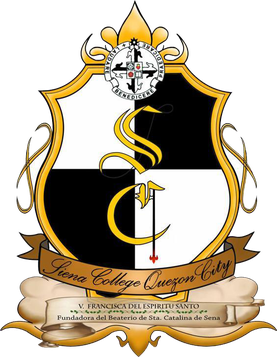
Siena College of Quezon City is a private, sectarian, non-stock basic and higher education institution run by the Congregation of the Dominican Sisters of St. Catherine of Siena in San Francisco del Monte, Quezon City, Philippines. It was established in 1959 by the Siena Sisters. The school offers tertiary education with degrees in Tourism, Business Administration, Hotel and Restaurant Management, Mass Communications, and Religious Education. It also offers pre-school, elementary, secondary education, and SPED.
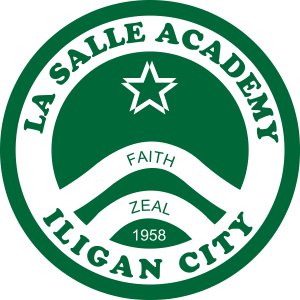
La Salle Academy is a private Catholic La Sallian basic education institution run by the Philippine District of the Institute of the Brothers of the Christian Schools in Iligan City, Lanao del Norte, Philippines. It was founded in 1958. It is the first of the third generation of La Salle schools founded by the De La Salle Brothers in the country, namely: La Salle Green Hills in Mandaluyong (1959), Saint Joseph School-La Salle in Bacolod (1960), and De La Salle Lipa in Lipa City (1962).

Holy Family Academy, also referred to by its acronym HFA, is a private Catholic basic education school administered by the Congregation of the Missionary Benedictine Sisters of Tutzing in Angeles, Pampanga, Philippines. It was established in 1906 as a Catholic parochial school and named Colegio de la Sagrada Familia in 1910. It is now one of the most prestigious schools in Angeles City. It has both elementary and high school departments as well as kindergarten and preparatory school classes for younger students. The school follows the Benedictine tradition of Ora et Labora, which means "Prayer and Work".
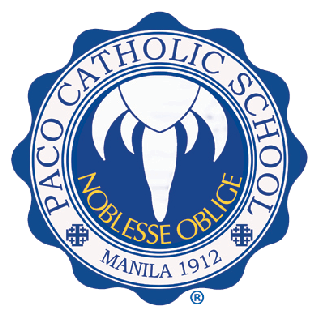
Paco Catholic School is a co-institutional private school located in the district of Paco in the City of Manila, Philippines. Paco Catholic school started in November, 1912 as an informal class for 50 young boys inside the chapel in the Peñafrancia section of the district by Raymond Esquinet, CICM, who was succeeded by Fr. Godofredo Aldenhuijsen, CICM. On May 14, 2022, in the 325th anniversary of the arrival of the Peñafrancia image in Manila and the 70th anniversary of the Parish, Jose Advincula solemnly declared the Paco Chapel, the same site of PCS, now Parish Church, the Archdiocesan Shrine of Our Lady of Peñafrancia.
The Benedictine Sisters of St. Walburg Monastery is a Roman Catholic congregation of women. whose motherhouse, St. Walburg Monastery, is located at Villa Madonna, in Villa Hills, Kentucky. It was founded in 1859 by three sisters of the Benedictine congregation of Mount St. Benedict Monastery in Erie, Pennsylvania, who came to Covington to teach the German-speaking children of St. Joseph's parish. They became an independent congregation in 1867. Villa Madonna Academy, a private, Roman Catholic K-12 school is part of the sisters' ministry in Kentucky. Besides operating the Academy, the sisters taught in parish schools and staffed St. John's Orphanage.
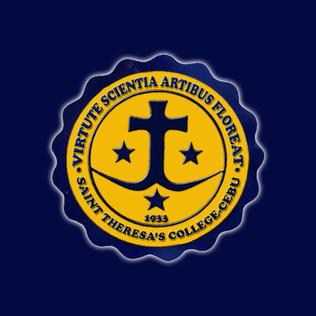
St. Theresa's College of Cebu (STC), is a private Catholic institution of basic and higher learning run by the sisters of the Immaculate Heart of Mary in Cebu City, Philippines. It was founded by the Immaculate heart of Mary sisters on June 1, 1933 upon the invitation of Monsignor Gabriel Reyes, then Archbishop of Cebu.
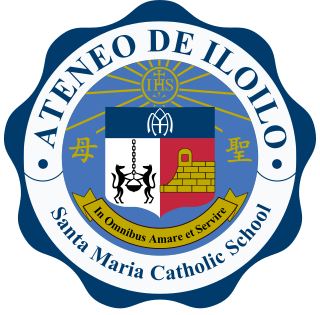
The Ateneo de Iloilo – Santa Maria Catholic School (AdI–SMCS), is a private, Jesuit, Catholic, Chinese-Filipino Basic Education school run by the Philippine Province of the Society of Jesus in Iloilo City, Philippines. It is a non-stock and non-profit institution duly accredited by the Philippine Council for NGO Certification (PCNC). It is also recognized by the Philippine Accrediting Association of Schools, Colleges and Universities (PAASCU) with Level 2 accreditation. Ateneo de Iloilo began in 1958 as a parochial school named Santa Maria Catholic School. In 2004, the school was officially recognized as a Jesuit school separate from the Santa Maria Parish and was renamed Ateneo de Iloilo - Santa Maria Catholic School. It is the eighth Jesuit school in the Philippines to be named Ateneo. Ateneo de Iloilo is a K-12 school and its curriculum includes Chinese language, Christian Living Education, and Ignatian Spirituality programs.

St. Paul University Quezon City (SPUQC), also referred to as SPU Quezon City, is a private, sectarian and coeducational university located in New Manila, Quezon City, Philippines. It was previously an all-girls' school and turned co-ed beginning school year 2006-2007.
Pilar College of Zamboanga City, Inc. is a private Catholic basic and higher education institution owned and administered by the Religious of the Virgin Mary (RVM) in Zamboanga City, Philippines. It was founded by the RVM Sisters in 1894 as a Cartilla School. It is located at R.T. Lim boulevard, Zamboanga City. The college provides Catholic education to the children and the youth of Zamboanga City and the southwestern part of Mindanao. It offers elementary, secondary and college education.
Espiritu Santo Parochial School is a basic education institution in Santa Cruz, Manila, with a core of faculty members and staff.

La Consolacion College Iriga is a private Catholic coeducational basic and higher education institution run by the Augustinian Sisters of Our Lady of Consolation (ASOLC) in the City of Iriga in Camarines Sur Province, Philippines. It was founded in 1949 and is one of the 24 Schools in the Philippines administered by the Augustinian Sisters of Our Lady of Consolation. The Patroness of the School is the Blessed Virgin Mary under the title Our Lady of Consolation whose feast is September 4. It is the only catholic institution of learning in Iriga City. Colloquially known as LaCo, LCC-Iriga maintains a lofty position among other schools in the city. It is a member of the Philippine Accrediting Association of Schools, Colleges and Universities(PAASCU).

St. Mary's Academy of Guagua, commonly referred to simply as SMAG, is a private Catholic coeducational basic education institution administered by the Religious of the Virgin Mary in Barangay San Roque, Guagua, Pampanga, in the Philippines. The school was established by the RVM Sisters in 1908.
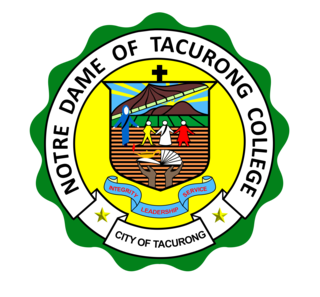
Notre Dame of Tacurong College is a private, Catholic basic and higher education institution run by the Archdiocese of Cotabato in the City of Tacurong, Sultan Kudarat, Philippines. It was established by the Oblates in 1950. It offers Elementary, Junior High School, Senior High School, and College to the neighboring municipalities, cities, and provinces. It has been a member of the Notre Dame Educational Association, a group of schools named Notre Dame in the Philippines under the patronage of the Blessed Virgin Mary.

St. Mary's College of Baliuag is a private, Catholic Co-educational basic and higher education institution administered by the Religious of the Virgin Mary in Baliwag, Philippines. It was formerly named Colegio de la Sagrada Familia or Holy Family School, when founded in 1912. On June 30, 1959, the Holy Family School was renamed St. Mary's Academy (SMA). It provides Preparatory, Primary, Secondary, and Tertiary education. It is the only Catholic school in the town of Baliuag, Bulacan.
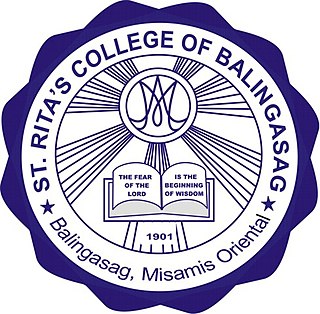
St. Rita's College of Balingasag is a Filipino, Roman Catholic, co-educational college in Balingasag, Misamis Oriental, Philippines. It was founded in 1901 by the late Jesuit missionary Rev. Fr. Gregorio Parache, SJ.
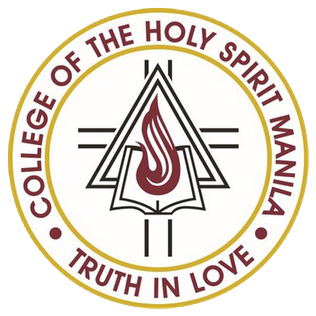
The College of the Holy Spirit Manila, or simply CHSM, was a private, Catholic education institution founded and ran by the Missionary Sisters Servants of the Holy Spirit in Manila, Philippines. Founded in 1913, College of the Holy Spirit Manila was established originally as Holy Ghost College through the invitation of then Manila Archbishop Jeremias Harty. Located initially on Legarda Street, the campus later moved along Mendiola Street, inside the Malacañang Palace Complex. It is one of the schools which comprises the Mendiola Consortium (MC) for academic cooperation along with Centro Escolar University Manila, La Consolacion College Manila, San Beda College Manila, and St. Jude Catholic School.
The Saint Paul University Surigao, also referred to as SPUS or SPU Surigao, is a private, Catholic basic and higher education institution run by the Sisters of Saint Paul of Chartres in Surigao City, Surigao del Norte, Philippines.

Malate Catholic School is a private Catholic gender-isolated K to 12 school in Malate, Manila, Metro Manila, Philippines established in 1917. It is accredited by PAASCU.

Christ the King College also referred to by its acronym CKC is a basic education institution run by the Missionary Sisters of the Immaculate Heart of Mary in San Fernando City, La Union, Philippines. Founded in 1931 by the ICM Sisters, it is one of the oldest Catholic institutions in La Union and the Ilocos Region. Like St. Theresa's College in Quezon City and four others, it is one of the six Immaculati Cordis Mariae (ICM) schools in the country founded by Mother Marie Louise De Meester and ran by Belgian Sisters.

Lourdes College Cagayan de Oro City (LCCDO), officially Lourdes College Inc., is a private, Roman Catholic basic and higher education institution managed by the Congregation of the Religious of the Virgin Mary in Cagayan de Oro City, Misamis Oriental, Philippines. It was founded by Archbishop James T.G. Hayes, S.J. in 1928. It is a member of the Philippine Accrediting Association of Schools, Colleges and Universities (PAASCU). The school has two campuses: the Integrated Basic Education Department (IBED) in Barangay Macasandig, and the Higher Education Department (HED) on Capistrano-Hayes Sts.
References
- ↑ St. Aphonsus Archives